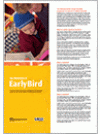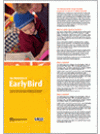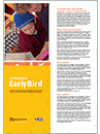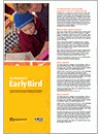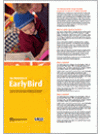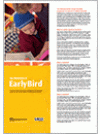These reports present both the final report for the evaluation of the outcomes of the EarlyBird Programme in New Zealand on behalf of the Ministry of Education and the Summary Report commissioned by the Ministries of Education and Health. These reports evaluate this early intervention programme for parents of children with autism spectrum disorders. Part of the development and implementation plan for the EarlyBird programme in New Zealand was a commitment to ongoing evaluation of the outcomes of this programme, and specifically to establish whether any gains for participants are maintained over time.
Purpose
Involving parents is an important part of early intervention for children with autism spectrum disorders (ASD). Parent education programmes have been developed as a way of providing parents with knowledge and skills to support their young child’s education and development. In New Zealand, the parent education programme EarlyBird was introduced in 2001, to help parents help their child with ASD, during their child’s early years. In 2003–04, a team of researchers from the University of Auckland undertook an evaluation to find out how effective the EarlyBird programme is in New Zealand contexts. This booklet summarises their evaluation.
Key Results
EarlyBird works
The researchers found that the EarlyBird programme does work. The parents who took part developed a greater understanding of ASD, and developed skills that helped them support their child’s learning and manage their child’s behaviour. What is more, these skills were maintained three months after participating in EarlyBird, when parents completed the APQ for the final time. The results were the same for the full and the condensed versions of the programme.
However, the evaluation also showed that for a number of parents, their stress levels increased during the EarlyBird programme. It is possible that some of the requirements of the programme, such as the need to make child-care arrangements, are stressful for parents. Three months after completing EarlyBird, however, parents’ stress reduced and some aspects of family functioning improved to levels that were better than before the parents had participated in EarlyBird. Nevertheless, the levels of parents’ stress were still very high.
Most of the families who took part were New Zealand European, which indicates some ethnic groups are under-represented on EarlyBird programmes. This could be because autism is not identified as early or as often in those groups, or that some ethnic groups do not participate in EarlyBird programmes for other reasons. As far as is known, there is no difference in prevalence of ASD between different ethnic groups.
The eight in-depth case studies supported the findings of the national study that families benefited from participating in the programme. All the parents who had participated in EarlyBird were positive about the programme and said they would recommend it to others.
Barriers to participating in National Autistic Society (NAS) EarlyBird
The uptake study identified some barriers to participating in the EarlyBird programme. These included:
- parents not knowing about the programme
- long wait-times for enough families in an area for a programme to run, which sometimes meant the child was too old for the parents to be eligible to attend
- reservations about extra work and stress at a time when families were already stressed, had heavy workloads, and limited child-care options, making it difficult for some families to attend the sessions
- the difficulty for some families in attending daytime sessions because of work and family commitments
- culture-specific barriers to gaining access to EarlyBird. Māori and Pasifika children have a later age of diagnosis, with many undiagnosed until they start school, while Korean families may not arrive in New Zealand until their child is of school age. There are also language barriers, and some Pasifika families felt that the ‘parents as the advocates for the child’ philosophy of the programme did not fit with their cultural values.

